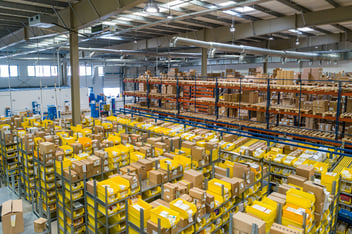Understanding the ins and outs of 3PL and how it can benefit your business
What is 3PL?
Third-Party Logistics, commonly known as 3PL, refers to the outsourcing of logistics and supply chain management functions to a third-party provider. In simple terms, it involves the use of an external company to handle various aspects of a company's logistics operations, such as transportation, warehousing, inventory management, and order fulfillment.
By partnering with a 3PL provider, businesses can focus on their core competencies while leaving the intricacies of logistics management to the experts. This allows companies to streamline their operations, reduce costs, and improve overall efficiency.
The role of a 3PL provider
A 3PL provider plays a crucial role in the supply chain ecosystem. They act as intermediaries between manufacturers, suppliers, retailers, and customers, ensuring a seamless flow of goods from point of origin to final destination.
The key responsibilities of a 3PL provider include managing transportation, warehousing, and distribution operations. They handle tasks such as freight forwarding, inventory management, order processing, packaging, and even customer service.
By leveraging their expertise and infrastructure, 3PL providers help businesses optimize their supply chain, improve inventory control, reduce shipping costs, and enhance customer satisfaction.
Benefits of using a 3PL
There are several benefits to using a 3PL provider:
1. Cost savings: Outsourcing logistics operations to a 3PL provider can result in significant cost savings. By leveraging their network, resources, and expertise, businesses can avoid investing in expensive infrastructure, technology, and personnel.
2. Flexibility and scalability: 3PL providers offer flexibility and scalability, allowing businesses to adapt to changing market conditions and seasonal fluctuations. They can quickly scale up or down resources based on demand, ensuring efficient operations and cost optimization.
3. Expertise and industry knowledge: 3PL providers specialize in logistics and supply chain management. They have a deep understanding of industry best practices, regulations, and emerging trends. By partnering with a 3PL provider, businesses can tap into this expertise and gain a competitive edge.
4. Enhanced focus on core competencies: By outsourcing logistics operations, businesses can focus on their core competencies and strategic initiatives. This leads to improved productivity, innovation, and overall business performance.
5. Improved customer service: 3PL providers often have advanced technologies and systems in place to track shipments, manage inventory, and provide real-time visibility. This enables businesses to offer superior customer service by ensuring on-time deliveries, accurate order fulfillment, and efficient returns management.
How does 3PL work?
The working of a 3PL provider involves a collaborative partnership between the business and the provider. The typical process includes the following steps:
1. Needs assessment: The business identifies its logistics requirements and determines the areas where it requires assistance from a 3PL provider.
2. Selection of a 3PL provider: The business evaluates different 3PL providers based on their capabilities, industry expertise, and cost-effectiveness. A suitable provider is chosen based on the specific needs of the business.
3. Integration and onboarding: The business and the 3PL provider work together to integrate their systems, processes, and data. This ensures seamless communication and efficient sharing of information.
4. Ongoing collaboration: The business and the 3PL provider collaborate closely to manage day-to-day logistics operations. This includes activities such as transportation management, warehousing, order processing, and inventory control.
5. Performance monitoring and optimization: The business regularly monitors the performance of the 3PL provider and assesses key metrics such as on-time delivery, order accuracy, and cost savings. Any necessary adjustments or improvements are made to optimize logistics operations.
By following this collaborative approach, businesses can leverage the capabilities of a 3PL provider to streamline their logistics operations and achieve operational excellence.
Choosing the right 3PL provider
Selecting the right 3PL provider is a critical decision for businesses. Here are some factors to consider when making this choice:
1. Industry expertise: Look for a 3PL provider that has experience and expertise in your industry. They should understand the unique challenges and requirements of your business.
2. Range of services: Assess the range of services offered by the 3PL provider. Ensure that they can cater to your specific logistics needs, whether it's transportation, warehousing, distribution, or value-added services.
3. Technology capabilities: In today's digital age, it's essential to choose a 3PL provider that has advanced technology solutions. Look for features such as real-time tracking, inventory management systems, and data analytics capabilities.
4. Scalability and flexibility: Consider the scalability and flexibility offered by the 3PL provider. They should be able to adjust their resources and services based on your changing business requirements.
5. Cost-effectiveness: Evaluate the pricing structure of the 3PL provider and ensure that it aligns with your budget and expected ROI. Look for transparency and clarity in pricing terms.
6. Reputation and references: Do thorough research on the reputation and track record of the 3PL provider. Seek references and testimonials from their existing clients to gauge their reliability and service quality.
By carefully considering these factors, businesses can make an informed decision and choose a 3PL provider that best suits their needs.





Leave a Comment